Mystery men shut down exhibit on ‘Karachi’s killing fields’
Art installation depicting ‘story of 444 killings by Rao Anwar' forcibly shut down at Frere Hall
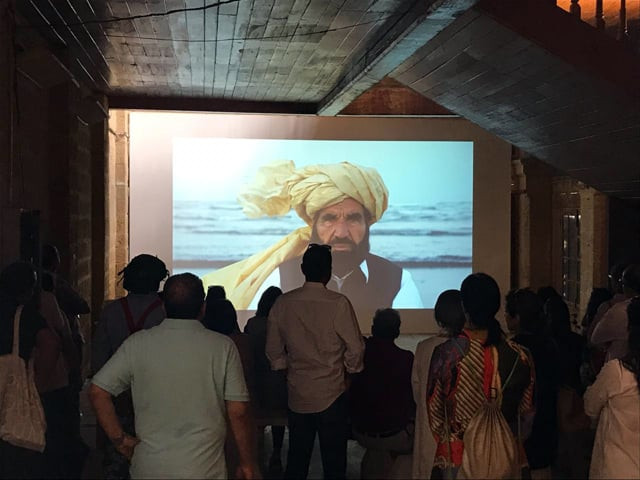
Art installation depicting ‘story of 444 killings by Rao Anwar' forcibly shut down at Ferere Hall. PHOTO: EXPRESS
The installation comprised 444 stone pillars with pyramidal tops, crowned with wilted metal flowers. Each pillar represented a victim of the infamous former SSP Rao Anwar – who is believed to have been directly or indirectly involved in the killings of 444 persons in suspect police encounters.
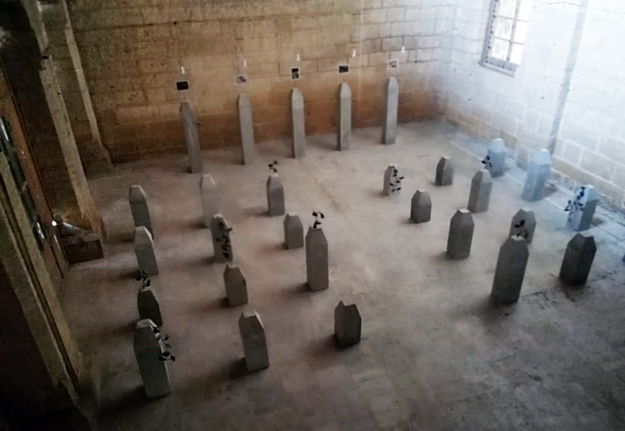 PHOTO: EXPRESS
PHOTO: EXPRESSThe installation also featured a short documentary featuring Muhammad Khan, the father of Naqeebullah Mehsud, who was allegedly killed in a fake police encounter on Anwar's orders. The documentary also explored facts surrounding the encounter, featuring drone footage of the site he was allegedly shot dead among other details.
Shutting it down
As the event opened doors to the public at around 10am on Sunday, visitors lazily strolled in and observed the installations, murmuring amongst themselves about a tragedy they may have followed in the news but had no idea of its victims or their loved ones. Some may have been struck by the odd display of headstones representing the victims. Others by the wilted metal flowers signifying the lives snuffed out too soon. Yet others would have stopped to see the film, perhaps contemplating what it would feel like to lose your son so callously to the very law enforcers who were sworn to protect his life.
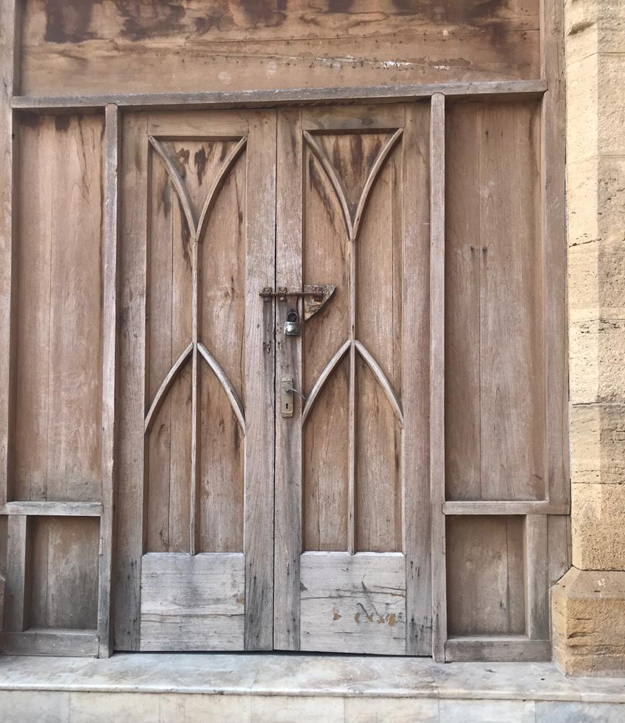 PHOTO: EXPRESS
PHOTO: EXPRESSAt around 12 noon, while the visitors were immersed in their thoughts, absorbing the artist's portrayal of one of the darkest hours of Karachi's bloody history, several cars pulled up in the parking lot of the Frere Hall gardens. Important-looking men swiftly climbed out and strode into the administration office.
Sometime later, the Frere Hall staff came to the lower gallery where the documentary was being screened and informed the organisers that it would have to be shut down. They asked everyone to leave the hall and padlocked the doors to the gallery.
Rao Anwar: Super cop, encounter specialist or political pawn?
The controversy
The move may have been aimed at stopping people from seeing the installation but it backfired spectacularly as soon after the incident, social media was abuzz with chatter over a 'controversial' piece of art that had touched the nerve of powerful quarters. Amid the buzz, there wasn't much clarity on who the important-looking men were – some said they were from law enforcement agenices, others pointed to personnel close to Rao Anwar and yet others simply shrugged, saying they were people who had stuff to hide.
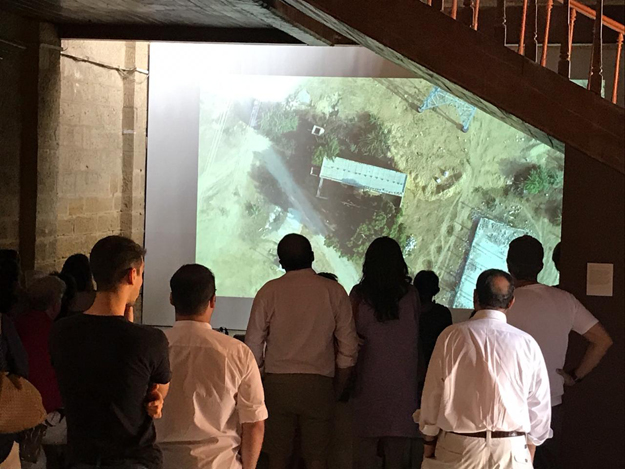 PHOTO: EXPRESS
PHOTO: EXPRESSAnd yet this was what was most baffling to the artist, Suleiman. "My work was just a story of incidents that took place in Karachi around a year ago. There was nothing in it that wasn't already public knowledge," she told a press conference outside the Frere Hall library, later that evening.
"We artists express our emotions," said Suleiman. "We speak about things that leave a mark on our souls." The incidents may have left a mark on the collective conscience of the country, but Faisal Siddiqui, who is representing Khan Muhammad in the Naqeebullah murder case, believes that Sunday's events showed there was still a long way to go for them to get justice.
Speaking at the press conference alongside Suleiman and civil activists Jibran Nasir and Karamat Ali, Siddiqui said that they had been increasingly hopeful for the last one and a half years that those who were "killed like cats and dogs" by Anwar would be given justice. "He killed so many people that you wouldn't find such statistics in the Guiness Book of World Records," said Siddiqui, while quoting official police records. "We were hopeful that Anwar would be punished for his crimes, but today's events clearly show that Rao Anwar and others like him are being protected."
Ali, a founding member of the Pakistan Institute of Labour, Education and Research, also assailed the move to silence an artist's expression, saying artists from across the world had come to Karachi to participate in the event and such a move would be counter-productive to the 'soft image' we wanted to show the world. "It was an ill-advised move and I would ask those behind it to reconsider their decision," he said.
'This is not art'
As Nasir was giving the closing remarks at the press conference, a man broke through the crowd and started telling everyone to leave. "This is a public park. You cannot do politics here," said the unidentified man, who picked up the media personnel's microphones from the make-shift podium and lay them on the ground.
This sparked a screaming contest between the man and Nasir. On being asked repeatedly to identify himself, the man introduced himself as the Karachi Metropolitan Corporation's Parks Director-General Afaq Mirza. At this, Nasir told Mirza to go and dig details of the corruption committed by his predecessor, much to the crowd's appreciation.
Mirza, who all this while was on the phone with Karachi Mayor Waseem Akhtar, refused to budge. Even after Nasir left, Mirza spoke to media personnel where he said that the Biennale organisers were given permission to display art and 'not vandalism'. "They have turned this place into a graveyard," he said emphatically. "This is not art."
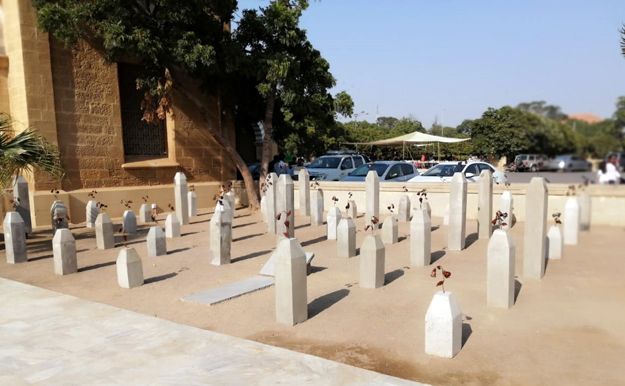 PHOTO: EXPRESS
PHOTO: EXPRESSAsked if he had known in advance what they were going to display, Mirza went into a vague response about good art and how it must portray the good of society. To another question about whether he had ordered the installation to be closed down, given that he was the authority on Karachi's parks, he said that the area was 'sensitive' and the art installation was in bad taste. He did say, however, that his department did not order for it to be shut down.
The Express Tribune made several attempts to reach out to the organisers of the Karachi Biennale 2019 through their public relations manager but no one was available for comment.


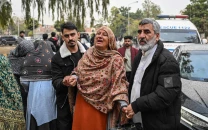



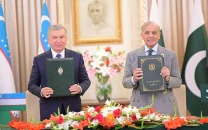












COMMENTS
Comments are moderated and generally will be posted if they are on-topic and not abusive.
For more information, please see our Comments FAQ